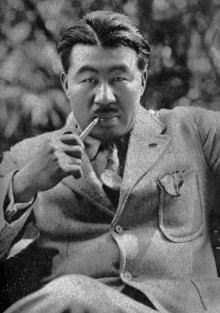 W
WChiang Kai-shek, also known as Chiang Chung-cheng and romanized via Mandarin as Chiang Chieh-shih and Jiang Jieshi, was a Chinese Nationalist politician, revolutionary and military leader who served as the leader of the Republic of China between 1928 and 1975, first in mainland China until 1949 and then in Taiwan until his death.
 W
WChisaka Takamasa was a Japanese samurai of the late Edo period who went on to become a soldier, government official, and businessman in the Meiji era. He served as a karō in the Yonezawa Domain's administration.
 W
WDekao Yokoo was a Japanese film actor active from the 1920s to the 1950s. He featured in over 90 films.
 W
WKim Chang-Ryong was a high-ranking officer in the Republic of Korea Army, the head of the Korean Counter Intelligence Corps, and South Korean President Syngman Rhee's most trusted right-hand man. He was assassinated in 1956 by army colleagues.
 W
WViscount Kataharu Matsudaira was a Japanese man who served as the daimyō of Tonami han in the early Meiji Era. Born the eldest son of Matsudaira Katamori, he succeeded Katamori's adopted son Nobunori in 1869. As the Meiji government had granted the former daimyō family of Aizu a 30,000 koku holding in northern Honshū, Kataharu became its daimyō, with Katamori technically in his "care."
 W
WŌtomo Yoshimune was a Japanese daimyō of the Sengoku period, heir of Otomo Sōrin at the head of the Ōtomo clan. He was the eldest son and successor of Otomo Sōrin as lord of the Bungo Province. His mother was an anti-Christian, known today only for the Jesuit epithet for her, Jezebel.
 W
WEmperor Taishō was the 123rd Emperor of Japan, according to the traditional order of succession. He reigned as the Emperor of the Empire of Japan from 30 July 1912 until his death on 25 December 1926.
 W
WYang Kyoungjong is the name of a supposed Korean soldier who, according to some historians, fought in the Imperial Japanese Army, the Soviet Red Army, and later the German Wehrmacht during World War II. He is, to date, the only soldier in recent history thought to have fought on three sides of a war, and this status has earned him recognition. Although both popular news outlets and several historians have regarded this as a fact, others have expressed doubt, and a 2005 Korean SBS documentary that focused on his case concluded there was no convincing evidence of his existence.
 W
WYoneda Torao was an Imperial Japanese Army veteran of the Boshin War. He was born in Kumamoto Prefecture. He was Grand Chamberlain of Japan (1878-1884). He was recipient of the Order of the Rising Sun and the Order of the Sacred Treasure.